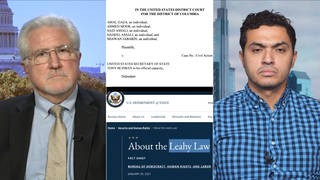
Related
Topics
Guests
- Robert Spohrerattorney representing the families of three Army soldiers killed in a Blackwater plane crash in Afghanistan.
In 2004, three Army soldiers and three Blackwater employees died when a plane operated by a Blackwater subsidiary crashed in Afghanistan. The families of the soldiers filed a wrongful death suit. Blackwater has claimed the lawsuit should be dismissed, but last week three judges on the 11th U.S. Circuit Court of Appeals in Atlanta rejected that argument. We speak to the families’ attorney, Robert Spohrer. [includes rush transcript]
Transcript
JUAN GONZÁLEZ: Blackwater is also facing a lawsuit over its actions in Afghanistan. In 2004, a plane operated by a subsidiary of Blackwater crashed there. Three Army soldiers and three Blackwater employees died in the crash. The families of the soldiers filed a wrongful death suit against Blackwater subsidiary Presidential Airways. Blackwater has claimed the lawsuit should be dismissed, but last week three judges on the 11th U.S. Circuit Court of Appeals in Atlanta rejected that argument.
AMY GOODMAN: Robert Spohrer joins us now from Jacksonville, Florida. He’s the attorney representing the families of the Army soldiers.
Robert Spohrer, welcome to Democracy Now! Tell us about the significance of this case and what the court ruled last week.
ROBERT SPOHRER: Good morning. Thank you very much. The 11th Circuit Court of Appeals on Friday rejected the claims to immunity that Blackwater and Presidential, its subsidiary, were raising in the court. Basically, Blackwater said because they were doing work traditionally done by the military — that is, transporting soldiers from one place to another — that they should have the immunity that the federal government would have: sovereign immunity. And the court rejected that argument and said, “No, you’re not part of the government. You’re a for-profit private corporation. You negotiated this contract at arm’s length. You have liability insurance for this type of event. And so, we’re not going to extend the immunity that is enjoyed by the sovereign to private corporations.”
The second legal argument that was raised by Blackwater was that this case would involve the courts second-guessing military decision making. It’s called the Political Question Doctrine. And the doctrine simply means that one branch of the government should not second-guess or interfere with the work of another branch of the government. The court said, “We agree with that in principle, but this is a simple case involving a plane that flew into a mountain in clear weather. There was no hostile activity. There was no mechanical malfunction. It involves simple negligence on the part of the crew, and therefore the courts will not be second-guessing any military decisions.” So the courts resoundingly rejected Blackwater’s claims to immunity.
AMY GOODMAN: The Afghanistan plane crash was brought up at last week’s congressional hearing on Blackwater. This is California Congressmember Henry Waxman, the chair, questioning Blackwater founder Erik Prince.
REP. HENRY WAXMAN: The crash was investigated, a joint — by a joint Army and Air Force task force and by the National Transportation Safety Board. The NTSB report found that Blackwater captain and first officer behaved unprofessionally, were deliberately flying the nonstandard route low through the valley for fun. The report found that the pilots were unfamiliar with the route, deviated almost immediately after takeoff, and failed to maintain adequate terrain clearance.
They also had a transcript of the cockpit voice recording, and on this recording the flight crew joked with each other, saying, “You’re an x-wing fighter Star Wars man, and you’re (expletive) right. This is fun!” The captain stated, “I swear to God, they wouldn’t pay me if they knew how much fun this was,” end-quote.
Mr. Prince, one allegation raised recently about Blackwater’s action is that your contractors have acted irresponsibly. One senior U.S. commander told the Washington Post, quote, “They often act like cowboys,” end-quote. Let me ask you about that crash of Blackwater Flight 61. In this case, did Blackwater’s pilots act responsibly, or were they, in the words of the U.S. commander, acting like cowboys?
ERIK PRINCE: I disagree with the assertion that they acted like cowboys. They — we provide a very reliable, valuable service to the Air Force and the Army in Afghanistan. Anytime you have an accident, it’s an accident; something could have been done better. It is not a Part 135 U.S.-type flying operation. There’s no flight services. There’s no flight routes. There’s no Navaids. It is truly a rugged, Alaska-style bush flying.
AMY GOODMAN: That’s Erik Prince, the founder of Blackwater. The House Oversight Committee Chair Henry Waxman also asked the Blackwater founder to explain why Blackwater should be paid millions of dollars to perform jobs traditionally done by the military.
REP. HENRY WAXMAN: One of the great ironies of this accident is that while the aircraft was being piloted by an inexperienced Blackwater pilot, a skilled military pilot with an exemplary safety record, Lieutenant Colonel Michael McMahon, was on board the flight as a passenger. This is what his widow wrote to me. She is Colonel Jeanette McMahon, and she works at West Point. She said, “Mike, like Mr. Prince, was a CEO of sorts in the military as an aviation commander and, as such, had amassed a great safety record in his unit. It’s ironic and unfortunate that he had to be a passenger on this plane versus one of the people responsible for its safe operation. Some would say it was simply a tragic accident, but this accident was due to the gross lack a judgment in managing this company.”
Mr. Prince, Colonel McMahon is asking why the taxpayers should be paying your company millions to conduct military transport missions over dangerous terrain, when the military’s own pilots are better trained and a lot less expensive. How do you respond?
ERIK PRINCE: We were hired to fill that void, because there is a different — it’s a different kind of airlift mission going in and out of the very short strips in Afghanistan. You have high altitude, short strips, unimproved runways, and you have transport aircraft that are designed to support a large conventional battle. We’re doing small missions. Typical cost of payload maxes out at 4,000 pounds. They can’t even hold that, because of the short altitude — or the high altitude, short strips they have to go in and out of.
AMY GOODMAN: Blackwater founder Erik Prince, responding to the questions of the House Oversight Committee Chair Henry Waxman. Robert Spohrer, you’re representing the three men who were killed, their families, the Army soldiers. Your response?
ROBERT SPOHRER: Well, this was a preventable, tragic and unnecessary crash. It’s been thoroughly investigated, first by the Army and the Air Force, who place the blame squarely on the Blackwater operation. Blackwater at that time rejected that and said they don’t know what they’re doing. They said, “Wait for the NTSB report.” Well, the National Transportation Safety Board then conducted a very thorough investigation and came to the same conclusion, that the sole cause of this crash was negligence on the part of the pilots. Blackwater has now said they reject the NTSB findings, as well.
Look, there is an expression in aviation, that you plan your flight, and you fly your plan. That didn’t happen here. Instead of flying a recognized route to the west, the crew went sightseeing in the mountains to the north of Bagram. They got into a box canyon. The plane they were flying could not climb above the 16,000-foot peak. They were in a canyon where they could not turn around, and tragically all six souls on board died.
Mr. Prince doesn’t address the question, which is, his company is paid hundreds of millions of dollars to provide responsible services, and they don’t do it. And then when they have a tragedy like this occur, they come to the court and ask for immunity. They basically want to be held — not held to account at all for their negligent conduct in this case. And the 11th Circuit at least has said, “No, we’re going to allow this case to go forward and let a jury hear the evidence and decide whether or not this crew was negligent and how this crash occurred.” So we’re looking forward to seeing Mr. Prince in the courtroom and having him answer some of our questions.
JUAN GONZÁLEZ: And, Mr. Spohrer, there was one survivor, wasn’t there, of that crash? What happened with that person?
ROBERT SPOHRER: The conclusion of the investigators was that Specialist Harley Miller, who was 24 years of age, survived the initial crash. We know that, because he had pulled survival gear from the plane. We see evidence where he had smoked cigarettes and tried to survive in the 14,000-foot elevation of the Hindu Kush Mountains in Afghanistan. He died within seven to 10 hours of the crash.
But one of the tragedies here is that had this plane been on a normal course, that the search-and-rescue aircraft would have known where to look for him, and he perhaps could have been saved. But as it was, they were way off of any recognized course up in the mountains, and so the search-and-rescue people were looking in the wrong area. So, sadly, Specialist Miller died along with the other five men in the airplane.
JUAN GONZÁLEZ: And the fact that the Army, on the one hand, did lay the blame at Blackwater, but then has recently given them a $92 million — the same firm — a $92 million contract?
ROBERT SPOHRER: That’s correct. What our investigation shows is that there was an initial immediate suspension for Blackwater. They were prohibited from carrying passengers for a short period of time, until certain safety steps were taken. But then, a short time later, they were permitted to resume carrying passengers, and now, as you say, just last month a new $92 million contract was let from the Pentagon again to Presidential Airways. I can’t understand why that would be allowed to happen. Certainly, this — problems with the safety of this aircraft would be unacceptable in a Part 135 operation here in the United States.
AMY GOODMAN: Jeremy Scahill, the AP report that says the State Department could possibly cancel the Blackwater USA contract in Iraq, awarding it to another company, in line with an Iraqi government demand. And this just out, as well, the U.N. wanting probes to determine whether private security contractors in Iraq have committed war crimes and for governments to ensure that the rule of law is applied. Ivana Vuco, the U.N. senior human rights officer in Iraq, told a news conference that private security contractors are still subject to international humanitarian law, and that means there are specific consequences for any breach.
JEREMY SCAHILL: Well, there is a United Nations working group on the use of mercenaries that has been investigating this issue, particularly the use of forces from countries in Latin America and elsewhere, whose home governments are actually opposed to the war. And, of course, Blackwater has made it a practice to hire up Chilean commandos, Colombian soldiers, and deploy them to Iraq, even though the home government of Chile, for instance, is completely opposed to the invasion and occupation. But we know the Bush administration’s stance on the United Nations: It’s a discussion group. International law has been rendered quaint. And so, where that’s going to go ultimately, we don’t know.
On the issue of Blackwater perhaps losing its work with the State Department, even if Blackwater were to leave Iraq tomorrow, it wouldn’t address the fundamental problem. You could give the work that Blackwater is doing to the other two major U.S. companies, Triple Canopy and DynCorp, which are already operating on State Department contracts in Iraq, and it doesn’t go away. You still have this cowboy atmosphere of lawless mercenaries roaming Iraq and shooting civilians. And so, at the end of the day, there’s no legislation right now in the Congress that addresses the linking of corporate profits to war making or addresses the radical privatization of the U.S. war machine. And until the Congress does that and stops passing legislation that legitimizes the use of mercenary forces, this is only going to continue to grow. There are more mercenary companies operating in the world today than there are nations registered at the U.N. I mean, this is an incredible subversion of world order and a very significant threat to peace.
AMY GOODMAN: Finally, the latest on the Christmas Eve shooting?
JEREMY SCAHILL: Right. Well, this was a case that we’ve talked about a lot on Democracy Now!: the Iraqi Vice President Adil Abdul-Mahdi, his bodyguard, shot and killed allegedly by a drunken Blackwater contractor on Christmas Eve 2006. We did know that Blackwater had whisked him out of the country within 36 hours of that killing and that Blackwater paid $20,000 in money to the victim’s family. What we’ve learned in recent days — The New York Times broke the story —- they identified this individual as a 27-year-old named Andrew Moonen, who lives in Seattle. He has an attorney. He is not exactly denying that he killed the bodyguard. They say that it’s a -—
AMY GOODMAN: Blackwater flew him out after the killing.
JEREMY SCAHILL: Blackwater flew him out, yes, after the killing, and they say that the U.S. government had instructed them to do so. And Erik Prince made a big deal about talking about how this individual was taken out of the country, was fired from Blackwater, was fined, was forced to pay for his plane ticket home, and, most significantly, had his security clearance withdrawn. But lo and behold, two months after the shooting takes place, Andrew Moonen is back in the Middle East working for another military contractor with the Pentagon, and he worked there from February to August and then recently, we understand, purchased a $270,000 home in Seattle. And it raises very serious questions that this individual is still walking around a free man with no charges brought against him yet.
AMY GOODMAN: I want to thank you all for being here. Robert Spohrer, thanks for joining us from Jacksonville, Florida. We’ll certainly continue to follow this court case, as you represent the families of the three Army soldiers killed in the Blackwater plane crash in Afghanistan. And, Jeremy Scahill, author of the book Blackwater: The Rise of the World’s Most Powerful Mercenary Army.












Media Options